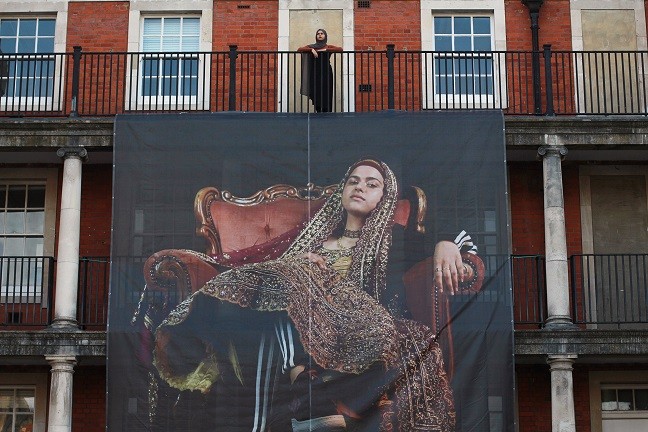
Published Monday 23 August 2021 at 14:59
British Textile Biennial 2021 (BTB21) returns this year with new artist commissions, exhibitions and performances presented against the backdrop of the impressive infrastructure of the cotton industry in Pennine Lancashire.
This October, the Biennial turns its attention to the global nature of textiles and the relationships they create, both historically and now, with a major new commission by Turner Prize winner Lubaina Himid, fashion historian Amber Butchart as guest curator, a groundbreaking, sustainable fashion project with designer Patrick Grant and a collaboration with artist James Fox and actor Maxine Peake. The final element of the programme is announced with C.P. COMPANY CINQUANTA, a retrospective of the Italian Sportswear company’s 50th anniversary.
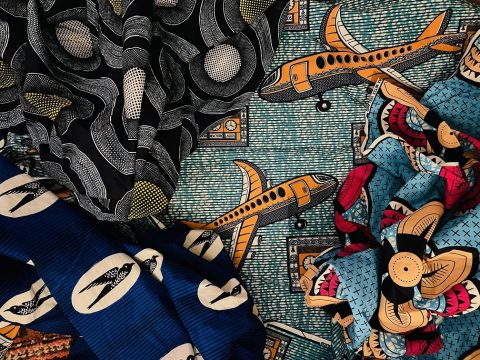
In line with celebrations for the brand’s 50th anniversary, C.P. COMPANY will be taking part in the British Textile Biennial 2021 programme, presenting a retrospective dedicated to five decades of Italian Sportswear, and Massimo Osti’s lasting legacy.
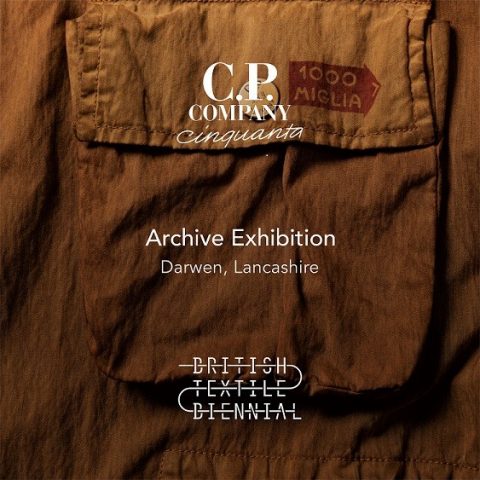
Blackburn with Darwen’s Executive Member for Growth and Development, Cllr Phil Riley said:
“This is a fantastic project and we’re delighted to support it. Thanks to Gary Aspden and his continued dedication in getting the best for Blackburn and Darwen – following the popular adidas exhibition now another international brand is holding a major event in his home town. Gary’s ability to bring major companies to the borough is simply exceptional.
“As the world starts to recover from the pandemic, we all need reasons to feel optimistic about the future, and it’s good to see the Textile Biennial growing and bringing new cultural ideas and audiences to the borough and the wider region.”
Taking place in Darwen, Lancashire, from 1 – 10 October, the display will feature exclusive C.P. Company archive pieces from throughout the label’s illustrious history. An arrangement of activities will run alongside this exhibition, including student workshops and panel talks, which will include speakers from the brand, as well as respected names in sportswear and casual culture.
In the grandiose surroundings of Blackburn Cotton Exchange, three artists, Jasleen Kaur, Jamie Holman and Masimba Hwati interrogate complex issues through family histories and lived experiences across three continents to reveal the residual cultural identities of the British Empire.

Over a six month period, the artists and curators have been in dialogue allowing themselves time to consider all aspects of their individual practices and presentation of their work together. The resulting exhibition is the ‘mess’ of new cultures that has emerged as a consequence of colonisation, each artist revealing something of the personal in order to better understand, or make sense of the political.
In the year marking the 90th anniversary of Gandhi’s historic visit to Darwen, Re-Thinking Khadi is a new work by Bharti Parmar that takes the textile archive of Blackburn Museum and Art Gallery as its focus, exploring how textiles, and specifically Khadi, might represent the ‘Black’ Indian body. The work stems from Parmar’s life-long interest in textile history and her personal narrative as the daughter of an Indian immigrant textile mill worker in Yorkshire and includes a film collaboration with award-winning, Blackburn-born film maker, Sima Gonsai.
Gandhi’s homespun philosophy is the inspiration behind Homegrown/Homespun; a collaboration with designer Patrick Grant, Super Slow Way and North West England Fibreshed. In Spring 2021 a field of flax and woad was planted on a piece of unused ground on the banks of the Leeds & Liverpool Canal in Blackburn, to be harvested and processed in the autumn and finally, spun, dyed and woven in Blackburn, to create the first pair of commercial homegrown and homespun jeans live in the town centre during the Biennial.
The tension between the industrialisation of cotton manufacturing and traditional cottage industry is the starting point for James Fox’s new work that explores the history of protest and punishment via the Lancashire loombreaker riots of 1826. The installation at Helmshore Mill includes James’ trademark hard-hitting embroideries and prints plus a new film collaboration with Maxine Peake presenting the tragic continuum of women’s experience of the criminal justice system over two centuries.
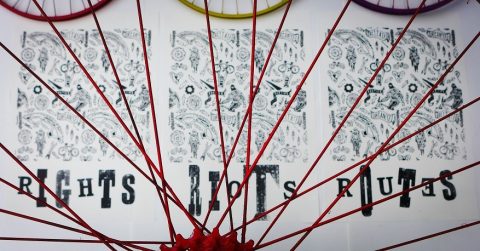
Reetu Sattar explores the contemporary tensions between traditional cultures in the Bangladeshi diaspora and the forces of modernity through the ever-evolving history of the cotton industry to be shown in Queen Street Mill, Burnley. An international artist based in Dhaka, this is a development of a body of work that began with a residency in Burnley in 2019.
Also in Queen Street Mill, Collateral, by Brigid McCleer presents a memorial to the hundreds of workers who die in factories and sweatshops across the world that supply the global garment industry. Made in collaboration with local embroiderers and inspired by a large-scale lace panel from the Gawthorpe Textile Collection commemorating the Battle of Britain, the work is a moving testament to the lives lost to feed the West’s seemingly bottomless appetite for fast fashion.
Raisa Kabir presents work at Queen Street Mill as a continuation of her Art in Manufacturing residency, commissioned by The National Festival of Making and the Textile Biennial in 2020. Inspired by The Textile Manufactures of India, an 18 volume set of fabric sample books assembled in 1866 by John Forbes Watson, a copy of which is held in the Harris Museum, Preston, Kabir worked at John Spencer Textiles in Burnley to create her own personal woven pattern designs that relate to collective imaginings of place and belonging in East Lancashire.
Emerging artist, Azraa Motala is creating a new series of painted portraits in a co-commission with The Harris, Preston where, as a young, aspiring artist she did not see herself represented on its walls. Unapologetic challenges the ongoing narrative of “otherness” and provides a platform for an overlooked community of young British South Asian women from Lancashire, too often invisible and unheard, whose painted portraits will be displayed in the Harris collection and reproduced on banners, hung on civic buildings in Preston, Blackburn, Pendle, Accrington and Burnley.
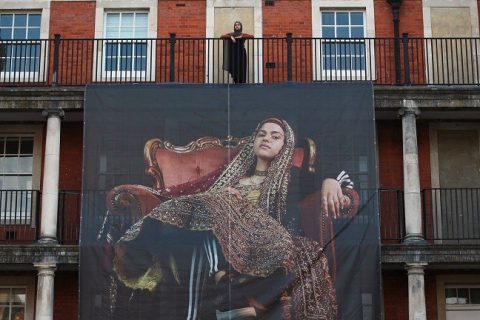
British Textile Biennial throws a spotlight on the nation’s creativity, innovation and expression in textiles against the backdrop of the impressive infrastructure of the cotton industry in Pennine Lancashire.
With its epic mills and grandiose civic architecture along the country’s longest waterway, the Leeds & Liverpool Canal, the landscape tells the story of textiles. This biennial festival celebrates that story in venues across East Lancashire while showcasing its contemporary expression with the community that has textiles in its DNA. British Textile Biennial is produced by Super Slow Way.
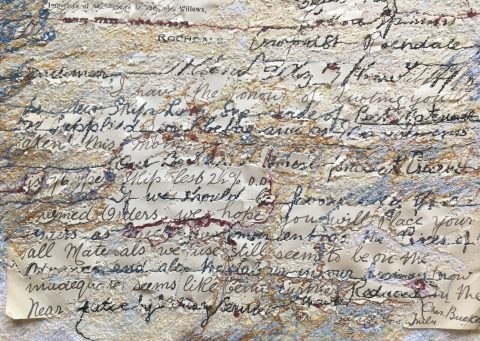
The Super Slow Way is a cultural development programme in Pennine Lancashire that uses the Leeds & Liverpool Canal as a vehicle for bringing people together on a waterway that everyone shares. Their work is shaped by and delivered with local residents from Blackburn to Pendle, working alongside artists, designers, manufacturers and growers, in fact anyone whose energy and imagination can help build more resilient and sustainable communities
The Super Slow Way is a partnership made up of the Canal & River Trust, Newground, the local authorities of Blackburn with Darwen, Burnley, Pendle and Hyndburn, UCLAN, Creative Lancashire and Arts Partnership Pennine Lancashire (APPL). Visit www.superslowway.org.uk
